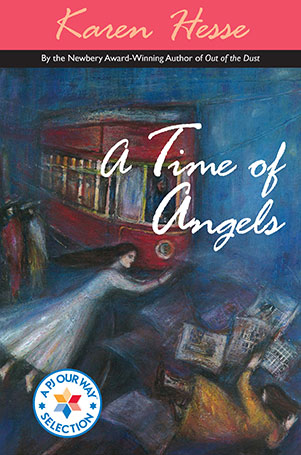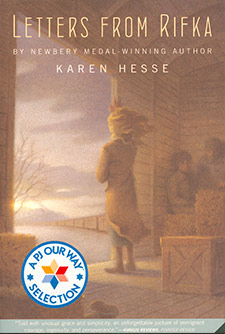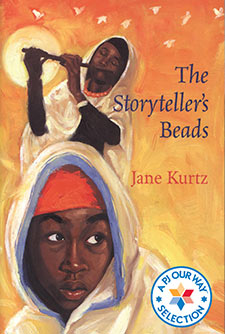A Time of Angels
When her family gets the flu during the 1918 epidemic, 14-year-old Hannah is forced to flee for her safety. Far from home, Hannah discovers that sometimes help comes from the most unlikely places.
Average Rating
( hint: Login to leave a review! )
56 Reviews
Leave Review
What the Book is About
Jewish Content & Values
Positive Role Models
Content Advisory
Talk it Over!
More for You
Hannah lives in a crowded Boston tenement apartment with her Tanta (Aunt) Rose, her aunt’s friend, Vashti, and her two little sisters. World War I has begun and the city is struck by the great influenza epidemic. Hannah is sent to Albany, New York, to escape illness, but she mistakenly boards the train to Brattleboro, Vermont. Alone and beginning to be sick with the flu, she arrives in Brattleboro, where she is taken in by a kind German man, Klaus Gerhard. Klaus respects Hannah’s Jewish traditions and cares for her until she is well enough to return home.
- Hannah keeps kosher (traditional Jewish dietary laws). She admits this to Klaus, who has been wondering why she does not eat the food he prepares. He is not at all judgmental and even learns how to prepare kosher food.
- Hannah and her family celebrate a traditional Shabbes (Shabbat: the Jewish day of rest). Tanta Rose blesses the children, lights candles, and makes Hamotzi (the blessing on challah), and the family shares a special meal together.
- Jewish holidays like Rosh Hashanah, Yom Kippur, and Sukkot are explored.
- Yiddish (a European language combining Hebrew and German) is spoken by many of the Jewish immigrant families that live near Hannah in the crowded tenements of Boston’s West End.
- Bikur cholim (visiting the sick): Klaus first meets Hannah in the local hospital where he volunteers to visit those who are sick. Much later in the story, Hannah visits her old nurse, Miss Carpenter, who has also been hospitalized with the flu.
- Klaus Gerhard, who is German, is taunted by anti-German townspeople. In the kind and respectful ways that Klaus treats his neighbors, despite their prejudices, he exemplifies the Jewish value v’ahavta l’rayacha kamocha (“love your neighbor as yourself,” Leviticus 19:18).
- Hannah is caring, sensitive, and hard working. Despite being in a Vermont town with very few Jews, Hannah maintains her Jewish traditions even when it is difficult for her to do so. Hannah knows how to take care of herself and others. She strips maple bark for hours to help earn her fare home, and she learns to knit a sweater in a week for the soldiers freezing in Russia. It is hard for Hannah to leave her new life in Vermont, but she is determined to return to Boston to find out if her sisters are alive..
- Tanta Rose loves Hannah and her sisters deeply. She works hard to support them and, though they are poor, she gives them simple pleasures like warm baths and special Shabbat food. Tanta Rose runs interference between the children and strict, distant Vashti. It is Tanta Rose who has the initial idea of sending Hannah away so that she won’t get ill. Tanta Rose instills in Hannah and her sisters a love of Judaism.
- Klaus Gerhard is one of the most appealing characters in the book. He does not judge others and does everything in his power to help Hannah heal. He encourages her to draw, and introduces her to the power and beauty of nature.
The following could be emotionally difficult:
- Many people, including Hannah, get very sick with influenza. Hannah’s beloved Tanta Rose, Harry Weitz’s father, and Ovadiah’s brother and sister die of influenza (among many others). When Hannah leaves Boston, her sisters are desperately ill and it is not revealed until the end of the story that they survive.
- Hannah’s parents are trapped in Russia. Her mother had been visiting relatives and can’t get home, and her father enlisted in the American army.
- Vashti, Tanta Rose’s friend and housemate, is a complex figure. She works hard to care for people who are ill, but is often critical and cold toward Hannah and her sisters.
- Klaus Gerhard respects everyone, yet he is the scapegoat for his neighbors’ anti-German sentiments. Shopkeepers refuse to wait on him and he is called “a dirty German” by a little girl in town.
During her recuperation in Vermont, Hannah writes to Harry and Vashti to assure them that she will try to get home as soon as she can. Ottiwell, the postman, does not mail Hannah’s letters and when Hannah finds out, she is furious! Right before she leaves, Hannah forgives Ottiwell, saying, “He had only been acting out of kindness.” Why do you think Ottiwell did not mail Hannah’s letters? Who was Ottiwell being kind to and why? Do you think he did the right thing?
Angels in the Bible: The word for angel in Hebrew is malach, which is also the Hebrew word for messenger. In Biblical stories, angels often come with a distinct task to carry out. Angels block Adam and Eve from returning to the Garden of Eden (Genesis: 3:24). Angels tell Abraham and Sarah that they will finally have a child together, even at their very advanced age (Genesis: 18: 2-17). And Jacob dreams of a ladder that stretches from earth toward heaven and is full of angels ascending and descending, inspiring him to continue on his difficult journey (Genesis: 28: 12-18). There is even a beautiful Traveler’s Prayer in Judaism that describes angels protecting the children of Israel: “on my right (angel) Michael, on my left (angel) Gabriel, in front of me, (angel) Uriel, behind me (angel) Rafael, and at my head the spirit of God.”
What the Book is About
Hannah lives in a crowded Boston tenement apartment with her Tanta (Aunt) Rose, her aunt’s friend, Vashti, and her two little sisters. World War I has begun and the city is struck by the great influenza epidemic. Hannah is sent to Albany, New York, to escape illness, but she mistakenly boards the train to Brattleboro, Vermont. Alone and beginning to be sick with the flu, she arrives in Brattleboro, where she is taken in by a kind German man, Klaus Gerhard. Klaus respects Hannah’s Jewish traditions and cares for her until she is well enough to return home.
Jewish Content & Values
- Hannah keeps kosher (traditional Jewish dietary laws). She admits this to Klaus, who has been wondering why she does not eat the food he prepares. He is not at all judgmental and even learns how to prepare kosher food.
- Hannah and her family celebrate a traditional Shabbes (Shabbat: the Jewish day of rest). Tanta Rose blesses the children, lights candles, and makes Hamotzi (the blessing on challah), and the family shares a special meal together.
- Jewish holidays like Rosh Hashanah, Yom Kippur, and Sukkot are explored.
- Yiddish (a European language combining Hebrew and German) is spoken by many of the Jewish immigrant families that live near Hannah in the crowded tenements of Boston’s West End.
- Bikur cholim (visiting the sick): Klaus first meets Hannah in the local hospital where he volunteers to visit those who are sick. Much later in the story, Hannah visits her old nurse, Miss Carpenter, who has also been hospitalized with the flu.
- Klaus Gerhard, who is German, is taunted by anti-German townspeople. In the kind and respectful ways that Klaus treats his neighbors, despite their prejudices, he exemplifies the Jewish value v’ahavta l’rayacha kamocha (“love your neighbor as yourself,” Leviticus 19:18).
Positive Role Models
- Hannah is caring, sensitive, and hard working. Despite being in a Vermont town with very few Jews, Hannah maintains her Jewish traditions even when it is difficult for her to do so. Hannah knows how to take care of herself and others. She strips maple bark for hours to help earn her fare home, and she learns to knit a sweater in a week for the soldiers freezing in Russia. It is hard for Hannah to leave her new life in Vermont, but she is determined to return to Boston to find out if her sisters are alive..
- Tanta Rose loves Hannah and her sisters deeply. She works hard to support them and, though they are poor, she gives them simple pleasures like warm baths and special Shabbat food. Tanta Rose runs interference between the children and strict, distant Vashti. It is Tanta Rose who has the initial idea of sending Hannah away so that she won’t get ill. Tanta Rose instills in Hannah and her sisters a love of Judaism.
- Klaus Gerhard is one of the most appealing characters in the book. He does not judge others and does everything in his power to help Hannah heal. He encourages her to draw, and introduces her to the power and beauty of nature.
Content Advisory
The following could be emotionally difficult:
- Many people, including Hannah, get very sick with influenza. Hannah’s beloved Tanta Rose, Harry Weitz’s father, and Ovadiah’s brother and sister die of influenza (among many others). When Hannah leaves Boston, her sisters are desperately ill and it is not revealed until the end of the story that they survive.
- Hannah’s parents are trapped in Russia. Her mother had been visiting relatives and can’t get home, and her father enlisted in the American army.
- Vashti, Tanta Rose’s friend and housemate, is a complex figure. She works hard to care for people who are ill, but is often critical and cold toward Hannah and her sisters.
- Klaus Gerhard respects everyone, yet he is the scapegoat for his neighbors’ anti-German sentiments. Shopkeepers refuse to wait on him and he is called “a dirty German” by a little girl in town.
Talk it Over!
During her recuperation in Vermont, Hannah writes to Harry and Vashti to assure them that she will try to get home as soon as she can. Ottiwell, the postman, does not mail Hannah’s letters and when Hannah finds out, she is furious! Right before she leaves, Hannah forgives Ottiwell, saying, “He had only been acting out of kindness.” Why do you think Ottiwell did not mail Hannah’s letters? Who was Ottiwell being kind to and why? Do you think he did the right thing?
More for You
Angels in the Bible: The word for angel in Hebrew is malach, which is also the Hebrew word for messenger. In Biblical stories, angels often come with a distinct task to carry out. Angels block Adam and Eve from returning to the Garden of Eden (Genesis: 3:24). Angels tell Abraham and Sarah that they will finally have a child together, even at their very advanced age (Genesis: 18: 2-17). And Jacob dreams of a ladder that stretches from earth toward heaven and is full of angels ascending and descending, inspiring him to continue on his difficult journey (Genesis: 28: 12-18). There is even a beautiful Traveler’s Prayer in Judaism that describes angels protecting the children of Israel: “on my right (angel) Michael, on my left (angel) Gabriel, in front of me, (angel) Uriel, behind me (angel) Rafael, and at my head the spirit of God.”




